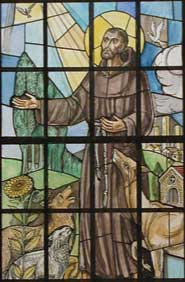Article #28
“All praise be yours, my Lord, through all that you have made.” Francis of Assisi (1181–1226), in “Canticle of the Sun.”

Francis of Assisi
All praise be yours, my Lord
Brother Francis of Assisi is deathly ill. He and a few of his associates have stopped to visit Clare at San Damiano on their way to answer a summons by the pope, but Francis has become too sick to travel any farther. Clare instructs the men to build their leader a little hut of wattles.
There he lies in agony, tormented in his body, feet, and eyes. Indeed, his eyes pain him so much that he becomes temporarily blind. Field mice invade the hut, scampering everywhere so that he is unable to sleep, nor even to pray. He begins to wonder if he is being punished for his sins. A cloud separates him from God. “My God, I deserve this, and even worse,” he says.
But then Francis hears God speak, posing this question to him: if he could find a treasure more precious than all the most precious things of the world, would he take it in place of his suffering?
Francis replies he is unworthy of such a treasure.
He hears a voice answering him, “Rejoice with all your heart, Francis, for such a treasure is life eternal which I have been keeping for you, and even now promise you; and this sickness and suffering of yours is a pledge of that treasure.”
Now Francis lies quiet in worship until dawn. Such joy fills him that he must share it with his spiritual brothers. He calls them to his bedside and tells them of his experience: “The Lord has stooped to assure me that I shall one day enter His Kingdom. So to show him my gratitude, I desired to com- pose this new song which you are about to hear.” The sick man rises and begins to sing in a native Italian dialect:
Altissimu, omnipotente, bonsignore,
tue sono le laude
la gloria et l'honore
et omne benedictione.
Most high, all-powerful, all good, Lord!
All praise is yours, all glory, all honor
And all blessing.
He continues through eight stanzas, including the famous lines,
All praise be yours, my Lord, through all that you have made,
And first my lord Brother Sun,
Who brings the day; and light you give to us through him.
From these lines it will become known as the “Canticle of the Sun.” It will be recognized as one of the first pieces of literature written in the Italian vernacular, and it will become a favorite of Christians around the world.
The winter of the hymn’s composition was 1224-25. The following year Francis dies, having added two more verses. Two years after that, Thomas of Celano will mention this canticle in his Vita prima, a biography of Francis.
—Dan Graves
Dig a Little Deeper
- Durant, Will. The Age of Faith; A History of Medieval Civilization–Christian, Islamic and Judaic–from Constantine to Dante: AD 325 – 1300. The Story of Civilization, Part IV. New York: Simon and Schuster, 1950.
- “Francis of Assisi.” Christian History & Biography No. 42.
- Goudge, Elizabeth. My God and My All. New York: Coward – McCann, 1959.
Next articles
Article #29: I can write no more
Thomas Aquinas (ca. 1224–1274), in conversation with Brother Reginald.
Article #30: Subject to the Roman Pontiff
Boniface VIII (ca. 1235–1303), in Unam Sanctam.
Article #31: All shall be well
Julian of Norwich (ca. 1342–ca. 1416), in her Showings.
Article #32: Ignorant of the Scripture
John Wycliffe (ca. 1324–1384), from On the Truth of the Holy Scripture.



